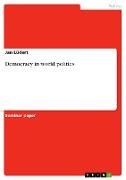- Start
- Democracy in world politics
Democracy in world politics
Angebote / Angebote:
Seminar paper from the year 2006 in the subject Politics - International Politics - General and Theories, grade: 1.0, The Australian National University, 0 entries in the bibliography, language: English, abstract: This text concerns itself with answering two central questions of the democratic principle in the current arena of world politics. The questions are: Is international politics ultimately all about
power and interest, such that democracy
should
remain of marginal importance to international
relations?
And
If democratic states are 'morally reliable', do
we need democratisation of the international
system itself, or can we just rely on coalitions
of these 'reliable' states? The study of International Relations (IR) has long been concerned with Realpolitik, a form of
political realism, which puts the self-help (military power) and survival (interest) motives of
states at the centre of its inquiry to explain the structural realities of the anarchic international
system, which is seen to exist under a constant threat of war. (Waltz, 1979) [Market] liberalism,
on the other hand, opposes the realist tradition and aims for the emancipation of humanity. In the
liberal tradition, the authority of democratic nations and the proliferation of free-markets are
believed to need to extend to the international system, in order to bring about peace, security
(Fukuyama, 1989) and happy consumers. The Neo-conservatives within the US administration
seem to have embraced both realism and market liberalism and combined the two into a mesh
that is hard to disentangle. Therefore, an obvious observation of the current era of US hegemony
does indeed reaffirm that power and the interest of agencies in the international arena are
prominent attributes of international politics. Powerful states, such as the US in Iraq, wage
unilateral wars to secure their strategic interests and at the same time support market liberalism,
while the biggest beneficiaries, multinational corporations (MNCs), smile broadly in the
background. In this regard, it appears as if notions of democracy, power, and interest are not only
juxtaposed, but are in fact feeding on each other, perpetuating but one form of democracy - that
of market liberalism.
Folgt in ca. 10 Arbeitstagen

